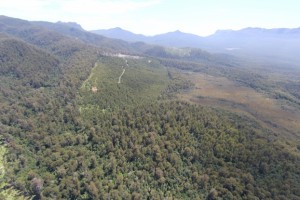 The head of Australia’s largest forestry investment company is upbeat about his sector. Ten years after founding New Forests, chief executive David Brand hosted a visit of the international board of Forest Trends to Tasmania, to show the reasons for his confident outlook. Source: ABC Rural
The head of Australia’s largest forestry investment company is upbeat about his sector. Ten years after founding New Forests, chief executive David Brand hosted a visit of the international board of Forest Trends to Tasmania, to show the reasons for his confident outlook. Source: ABC Rural
Mr Brand said Forest Trends directors shared his positive view of the industry’s future.
“I think the thing we have here in Australia is a very stable economy,” Mr Brand said. “In fact, the return requirements from our investors here are lower than most of our competitors, because of the lower political risk, sound economy, infrastructure in place.
“All the techniques and technology and labour skills are here, so that’s number one.
“Number two is that we’ve got productivity that can grow trees on a commercial basis,” he said.
“We can invest in forestry and it can generate a strong return, long-term, for institutional investors.”
The Washington DC-based not-for-profit Forest Trends comprises forest managers, policy leaders, environmental experts and investors from North and South America, Asia, Africa, Europe and Australia.
This week, its directors examined Tasmania’s forests, including New Forests’ Forico’s hardwood operations, Timberlink’s softwood enterprises and temperate rainforest in the state’s north-west.
Forest Trends urges innovation in markets for forestry products Forest Trends’ mission is to bring value to communities by valuing the assets that forests provide.
It is a non-government, non-profit company with an entrepreneurial agenda.
Chairman Olof Johansson said Australia was yet to fully develop financial instruments and regulations that valued forests for their ecological services.
He said investors could help stop deforestation if economic tools and incentives were created for maintaining natural ecosystems.
Mr Johansson is senior vice president of environment at Sveaskog in Sweden, the largest forest owner in Europe, with four million hectares under management.
“Forests have been managed for a very long time in Sweden,” he said. “I think it’s important for us too to try to look at new opportunities to incorporate the different values, apart from the timber commodity.
“The improvement of capital, both in terms of finances and if I can use the word ‘nature capital’.
“But also social capital, the relationship to communities where we are working, which is very important.
“We have to consider the effect of the forestry business in all areas, and that has huge business impacts.”
Forest Trends challenges Tasmanian mindset Forest Trends founder and president Michael Jenkins said forests could no longer be viewed merely as fibre farms.
He said a broader conception of sustainable forest management and conservation was needed to bring value to communities.
And Mr Jenkins said Tasmania could be the next leader in sustainable forest management.
“We are a planet that’s approaching 10 billion people,” Mr Jenkins said. “We are over-exploiting all of our resources. We are running out of time in terms of being able to rationalise all of the needs that we have.
“This is really a critical time that we’re in and we need real leadership.
“Tasmania could very quickly, if you could get the mindsets right, turn to the very affirmative picture of being a Costa Rica in this part of the world and showing the world how to do it.”





